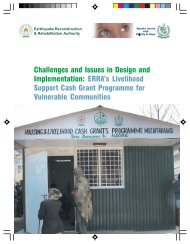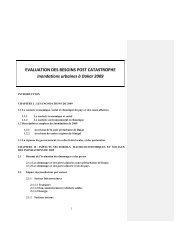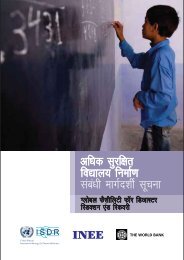Aceh Emergency Response and Transitional Recovery ... - UNDP
Aceh Emergency Response and Transitional Recovery ... - UNDP
Aceh Emergency Response and Transitional Recovery ... - UNDP
Create successful ePaper yourself
Turn your PDF publications into a flip-book with our unique Google optimized e-Paper software.
(3) Shelter <strong>and</strong><br />
Infrastructure<br />
(4) Governance<br />
<strong>and</strong> Capacity<br />
Building<br />
• The recruitment of local facilitators<br />
who were able to win<br />
the trust of affected communities<br />
was a significant contributing<br />
factor in overcoming the<br />
challenges of temporary shelter.<br />
• Support in the area of emergency<br />
shelter, while not a usual<br />
area of <strong>UNDP</strong> support, helped<br />
to gain access to target IDP<br />
communities <strong>and</strong> to better<br />
formulate recovery strategies.<br />
• Strong community participation<br />
through UN-Habitat CAP<br />
process has resulted in high<br />
degree of ownership amongst<br />
target populations.<br />
• Early on-the-ground support<br />
for emergency coordination<br />
<strong>and</strong> reconstruction planning<br />
provided a good base for subsequent<br />
shift towards promoting<br />
good governance in the reconstruction<br />
process, as well<br />
as in public administration<br />
Area Success Factors Challenges<br />
ners to gain access to affected<br />
communities <strong>and</strong> formulate<br />
tracting of livelihoods activities.<br />
stronger sustainable livelihoods<br />
recovery activities. be able to quickly identify pri-<br />
• A major difficulty has been to<br />
• A non-sectoral, communitydriven<br />
approach is preferable<br />
to strict sectoral work (fisheries,<br />
agriculture, etc.), in order<br />
to ensure assistance can flexibly<br />
respond to the varied<br />
needs of communities.<br />
ority beneficiaries <strong>and</strong> implement<br />
a targeted programme to<br />
meet their needs. By working<br />
closely with the community<br />
<strong>and</strong> government agencies it is<br />
possible to ensure those sections<br />
of the community who<br />
• Operating through experienced<br />
national <strong>and</strong> interna-<br />
targeted assistance.<br />
are missing out are receiving<br />
tional NGOs has significantly<br />
exp<strong>and</strong>ed the outreach capacity<br />
of the ERTR programme in<br />
order to do adequate assessments<br />
of livelihoods recovery<br />
needs.<br />
• Underst<strong>and</strong>ing the short term<br />
labour market needs <strong>and</strong> then<br />
ascertaining the longer term<br />
labour market needs; the construction<br />
boom will create new<br />
employment opportunities, but<br />
over time however we must be<br />
able to retrain <strong>and</strong> recapitalise<br />
the workforce as the reconstruction<br />
boom declines.<br />
• Great uncertainty amongst<br />
IDPs about the future, coupled<br />
with a fear that temporary<br />
re-location may become permanent,<br />
generated reluctance<br />
amongst many affected people<br />
to re-locate to temporary shelters.<br />
• Early focus on supply-side issues<br />
is necessary.<br />
• Inflation <strong>and</strong> material price<br />
increases has meant replanning<br />
of resources <strong>and</strong> reducing<br />
coverage of the housing<br />
reconstruction programme.<br />
• Need to balance need to deliver<br />
with community-based<br />
participatory approached to<br />
ensure community ownership.<br />
• Society cohesion in rural <strong>and</strong><br />
urban areas vary <strong>and</strong> hence<br />
more time <strong>and</strong> resources are<br />
needed for participatory planning<br />
processes in urban areas<br />
where social cohesion is lower.<br />
• Need to deliver on reconstruction<br />
planning on tight time<br />
frames can reduce focus on<br />
importance of consultation<br />
<strong>and</strong> participation.<br />
• Early confusion on roles <strong>and</strong><br />
responsibilities within Government<br />
for rehabilitation /<br />
39


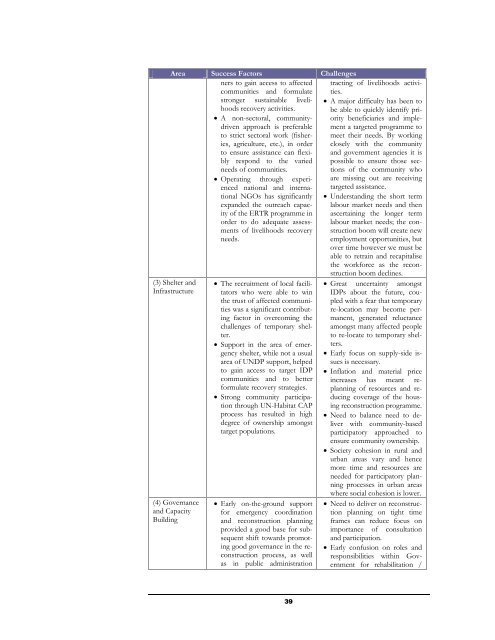

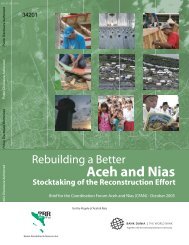
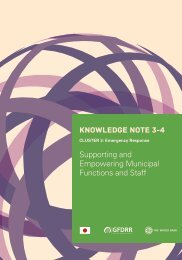
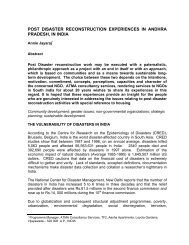
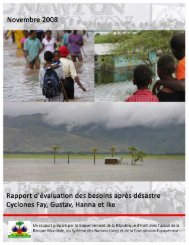
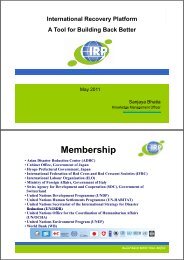
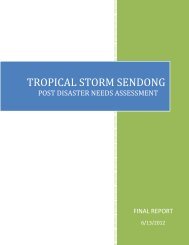
![View full document [PDF 7.65 MB] - unisdr](https://img.yumpu.com/48902806/1/178x260/view-full-document-pdf-765-mb-unisdr.jpg?quality=85)
